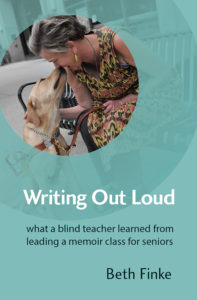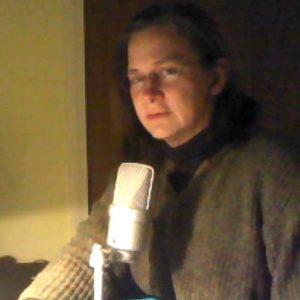
You can now buy the audio version of Writing Out Loud.
If you ask me, the best way to enjoy my new book is to hear it…out loud. So now’s your chance: The audio version of “Writing Out Loud” is now available at Amazon.com. And Audible.com, too
I would have liked to have narrated the audio book myself, but I’m not good at reading Braille and talking at the same time. Eyebrows up! Nancy Sayre at Golden Alley Press invited Mike and me to help audition potential narrators. We used an online service called ACX, which matches publishers with readers and audio producers. We auditioned several narrators and ultimately identified Robin Sitten as just the right voice. And—thanks to Golden Alley Press—you can win a free audio book! Just email bethfinke@goldenalleypress.com and enter WOL Freebie in the subject line. Golden Alley Press will choose the winner from the first 50 entries.
Audio book narrators have been an integral part of my life since I lost my sight in 1985. For all those years, I’ve wondered how it all works, and this audio book gave me the opportunity to ask the questions. Robin generously agreed to be interviewed for the Safe & Sound blog, and she provided so many enlightening answers to my questions that we decided to run the interview in two parts.
So here goes with Part I of the interview:
What got you into reading audio books?
I started recording textbooks for Learning Ally (Recording for the Blind and Dyslexic) in 1995, just because I enjoy the challenge of reading out loud! I had always wanted to do it, but my work schedule didn’t allow it. I had to be out of work before I could give RFB&D the two hours per week they asked for.

Robin Sitten sittin’ at the microphone.
Can you give me a brief explanation about how this ACX thing works? How did you find out about it?
ACX is a kind of matching service for authors and narrators, and is part of Audible.com. Authors (or publishers) post books they would like recorded, and narrators audition for them. I found it through an Internet search.
What was it about Writing Out loud that motivated you to audition to read it?
I am drawn to non-fiction, memoirs, straightforward narrative. There is a lower expectation of “performance,” compared to novels. Plus, I believe that fewer people audition for them!
How many books do you audition for?
When I am ready for a new project, I may audition for between 5 and 10 titles a week. In many ways, it’s a game of odds. Not quite a lottery system, but you certainly can’t win if you don’t play.
How did you go about recording Writing Out Loud—how do you prep, how do you keep your voice strong? Do you read the book through before you begin narrating? Do you do a trial run — read a single chapter say, and then adjust?
I tend to read “cold;” that is, I don’t pre-read the pages, or practice at all. I may give the manuscript the once-over when I first get it, to look out for unusual pronunciations, or formats. Nancy Sayre and I got on the phone and worked through a bunch of questions that I had. Some publishers are available to do this; some don’t. Nancy let me know you are something of a fast talker, and shared a YouTube interview of you. Not that I was trying to do an impression of you – just that the voice should seem like yours, and it did help to get a sense of your rhythms.
I don’t do much prep otherwise. I just charge right in. Sometimes I will record a couple of takes on a particular line, and decide later which I like. One author I worked with had a detailed outline of his characters, pronunciation of their names, approx ages, etc. But that’s not typical
I only record about an hour at a time. I can do a two-hour stretch, but not every night. So how long I read depends on my schedule and the contract deadlines.
I guess it’s just experience that keeps the voice strong. But a little fennel tea is nice in the winter, too.
What do you find is the most difficult thing about recording books?
A lot of times, the manuscript is just not in good shape. Not proofread, for example, or structured with natural breaks. A lot of ACX is self-published material, and an author doesn’t necessarily have editorial experience, or advanced writing skills. They know in their head how the story sounds to them. Some phrases that are fine in print are difficult to speak. I wouldn’t expect them to know that.
The other hard part is scheduling. This is not my full-time job, and I don’t have a sound proof studio. Both of those factors limit when and where I can record, and getting it all in can be hard.
Love these details about the recordings. Thanks.
I found Robin’s answers really interesting, too. There’s a lot more to recording books than we might think.
“Upon your release of Writing Out Loud”, it rose to the top of my reading list. After 4 hours of nonstop listening I had to take a break only to say thank you for a fascinating and inspirational book. If I lived in Chicago I would sign up for your writer’s workshop!
Bruce, that is one of the highest compliments you could give me. Thank you! One of the main reasons I wrote this book was to motivate others to get started writing their own life stories and/or start a writing class like this in their own community.
Upon your release of “Writing Out Loud”, it rose to the top of my reading list. After 4 hours of nonstop listening I had to take a break only to say thank you for a fascinating and inspirational book. If I lived in Chicago I would sign up for your writer’s workshop!
Leave a Response